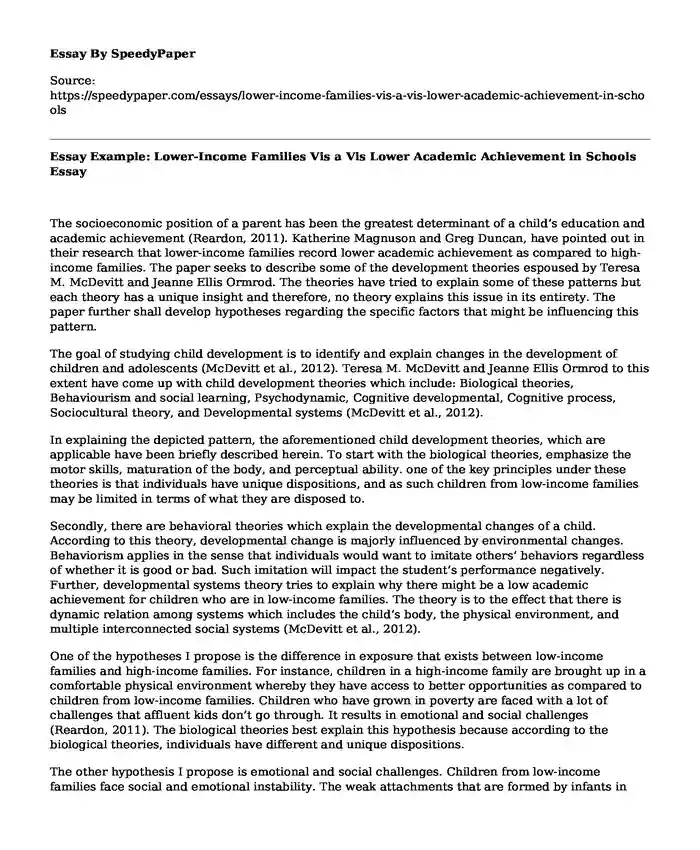
| Essay type: | Evaluation essays |
| Categories: | Learning Statistics School Family Social issue |
| Pages: | 3 |
| Wordcount: | 648 words |
The socioeconomic position of a parent has been the greatest determinant of a child’s education and academic achievement (Reardon, 2011). Katherine Magnuson and Greg Duncan, have pointed out in their research that lower-income families record lower academic achievement as compared to high-income families. The paper seeks to describe some of the development theories espoused by Teresa M. McDevitt and Jeanne Ellis Ormrod. The theories have tried to explain some of these patterns but each theory has a unique insight and therefore, no theory explains this issue in its entirety. The paper further shall develop hypotheses regarding the specific factors that might be influencing this pattern.
The goal of studying child development is to identify and explain changes in the development of children and adolescents (McDevitt et al., 2012). Teresa M. McDevitt and Jeanne Ellis Ormrod to this extent have come up with child development theories which include: Biological theories, Behaviourism and social learning, Psychodynamic, Cognitive developmental, Cognitive process, Sociocultural theory, and Developmental systems (McDevitt et al., 2012).
In explaining the depicted pattern, the aforementioned child development theories, which are applicable have been briefly described herein. To start with the biological theories, emphasize the motor skills, maturation of the body, and perceptual ability. one of the key principles under these theories is that individuals have unique dispositions, and as such children from low-income families may be limited in terms of what they are disposed to.
Secondly, there are behavioral theories which explain the developmental changes of a child. According to this theory, developmental change is majorly influenced by environmental changes. Behaviorism applies in the sense that individuals would want to imitate others’ behaviors regardless of whether it is good or bad. Such imitation will impact the student’s performance negatively. Further, developmental systems theory tries to explain why there might be a low academic achievement for children who are in low-income families. The theory is to the effect that there is dynamic relation among systems which includes the child’s body, the physical environment, and multiple interconnected social systems (McDevitt et al., 2012).
One of the hypotheses I propose is the difference in exposure that exists between low-income families and high-income families. For instance, children in a high-income family are brought up in a comfortable physical environment whereby they have access to better opportunities as compared to children from low-income families. Children who have grown in poverty are faced with a lot of challenges that affluent kids don’t go through. It results in emotional and social challenges (Reardon, 2011). The biological theories best explain this hypothesis because according to the biological theories, individuals have different and unique dispositions.
The other hypothesis I propose is emotional and social challenges. Children from low-income families face social and emotional instability. The weak attachments that are formed by infants in poverty lead to insecurity in the early childhood years. Young children need a healthy environment when learning to enhance optimal brain development. Additionally, low-income parents are overwhelmed with self-esteem issues, a sense of powerlessness, and depression, which they pass to their children in the form of negativity and the failure to focus on the children’s needs. The theory that supports this hypothesis is the sociocultural theory which describes the social process a child goes through before becoming an adult.
In conclusion, low academic achievements cannot be solely explained by the poverty factor. The human mind perceives the environment indiscriminately in trying to understand the world. When a child understands his/her environment, he/she is likely to develop confidence and feelings of self-worth which as a result will inform their personality and performance.
References
McDevitt, T. M., Ormrod. J.E., Cupit, G., Chandler, M., & Aloa, V. (2012). Child development and education. Pearson Higher Education AU. ISBN: 9781442547391
Reardon, S. F. (2011). The widening academic achievement gap between the rich and the poor: New evidence and possible explanations. Whither opportunity, 1(1), 91-116. ISBN:9780871543721
Cite this page
Essay Example: Lower-Income Families Vis a Vis Lower Academic Achievement in Schools. (2023, Dec 03). Retrieved from https://speedypaper.net/essays/lower-income-families-vis-a-vis-lower-academic-achievement-in-schools
Request Removal
If you are the original author of this essay and no longer wish to have it published on the SpeedyPaper website, please click below to request its removal:
- To Study or Not to Study - Education Essay Example
- Free Essay Answering How Childhood Obesity Is Linked to Poverty in America
- Essay Sample: Qualitative Analysis Approach in Decision-Making
- Financial Analysis for Aetna Inc., Term Paper Example
- Essay Example on Stuttering in School-Age Children
- Paper Example: SWOT Analysis - Real Estate Industry
- Free Essay: Prevention and Management of Pressure Ulcers
Popular categories




